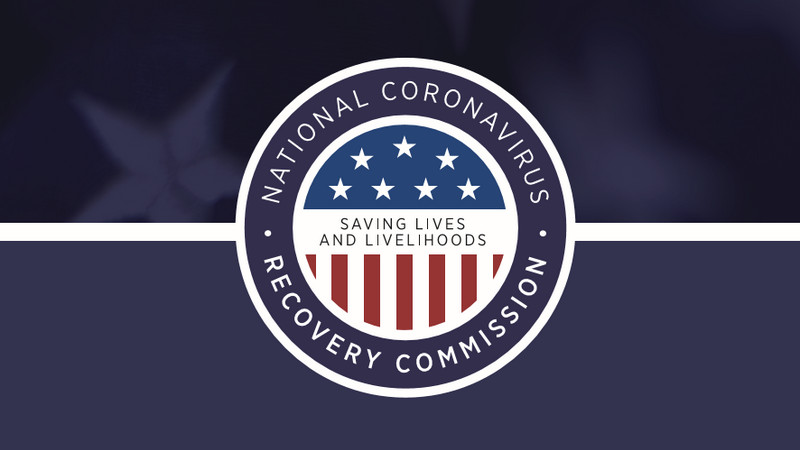Just two weeks after announcing the creation of a “National Coronavirus Recovery Commission,” the Heritage Foundation released its initial set of recommendations, which, unsurprisingly, pushes policy actions that would advance the right-wing think tank’s policy agenda, including further deregulation of business and privatization of education funding.
The commission’s April 20 report, which proposes steps to be taken over the next 30 days, warns that the economic costs of the widespread shutdowns could reach a “tipping” point in June, plunging the country into “economic catastrophe” and depression.
As Right Wing Watch noted when the commission was announced, “Heritage has a long history of preparing right-wing policy road maps beginning with the ‘Mandate for Leadership’ that President Reagan used as his anti-tax, anti-regulation, anti-government guide to begin rolling back decades of policies grounded in the New Deal and its progressive successors.”
It’s not as if anti-regulatory activists within the Trump administration need to be told to take advantage of the crisis; the Washington Post reported Tuesday that administration officials are “planning to launch a sweeping effort in the coming days to repeal or suspend federal regulations affecting businesses.” But the Heritage commission’s “proposals” could be used to help justify such actions.
Included in the commission’s recommendations to governors for jump-starting the economy are “reducing or removing restrictive labor policies, such as increased minimum wages.” The commission recommends that states do away with teacher certification requirements and occupational licensing requirements.
The commission encourages the federal government to order that agencies consider making permanent all the regulations that have been waived in response to the pandemic and calls for the federal government to review “all regulations that inhibit economic growth and extend the two-for-one and centralized review requirements to the independent regulatory commissions and agencies.” (Two-for-one refers to Trump’s executive order that for every new regulation implemented, two must be revoked.) And the commission says, “Congress should provide the President, the Office of Information and Regulatory Affairs, and Cabinet department Secretaries the ability to suspend costly regulations without extensive process.”
The recommendations also call on Congress to create a “safe harbor” for businesses that reopen so they won’t be legally liable if they spread the virus as long as they have followed CDC guidance in good faith.
The commission also recommends that states make “existing education funding student-centered and portable”—wonk-speak for a kind of universal voucher system long dreamed of by opponents of public education and proponents of diverting public education funds to support private schools and homeschooling.
The commission encourages state and local governments to “observe the Supreme Court’s 2017 Trinity Lutheran decision, which held that government authorities may not exclude religious groups that are otherwise eligible from competing for government benefits because of their religious status.” The response to the pandemic has already broken new ground in weakening church-state separation, something religious-right groups are certain to try to expand, the way they are seeking to expand the Trinity Lutheran decision to require that more government funds flow to religious institutions.
The commission’s proposals come amid right-wing-generated protests aimed at easing social distancing restrictions and shifting accountability from the president to governors. “The longer policymakers take to begin stated reopening based on local conditions, the more severe and long-lasting the adverse economic and social effects will be,” the commission’s report reads.
The painful consequences of shutting down so much economic activity are unquestionably real, and governments at all levels are wrestling with how to move forward responsibly. The Heritage commission makes some common-sense recommendations, like calling for active partnership between governments at all levels, businesses, and civil society. It promotes expanded testing and contact tracing, public health measures that state and local officials probably don’t need Heritage to tell them about.
Among the least necessary recommendations is the one encouraging the president to “continue regular briefings,” which have given Trump a daily platform for disseminating self-serving narratives and misinformation and demeaning reporters. The commission says it will be a challenge to convince Americans that it is safe to return to more normal social and economic activity given that new cases will continue to be reported. “People will need to be reassured that it is safe to work and patronize local businesses,” the commission recommends. “Robust public education should include reinforcing Americans’ mutual responsibility and accountability to others through appropriate, targeted ‘social distancing’ and other hygienic and nonpharmacologic interventions (NPI).”
The commission also recommends “greater emphasis on bipartisanship to restore trust” in “American democracy and institutions.” That’s not a bad thing, but it should be noted that the Heritage Foundation is not exactly known for promoting bipartisanship or trust in democratic institutions. One wonders if someone at the White House will call to Trump’s attention the commission’s final recommendation, which for some reason is directed not at public officials but at the private sector and civil society: “Our leaders must work to rebuild this trust by resisting the temptation to ‘score political points’ and by seeking bipartisan implementation of bipartisan solutions.”
Heritage seems to be going to great lengths to give people who visit the commission’s website or read its report the impression that the “national” commission is some kind of official government body rather than simply a vehicle for promoting the views of the conservative scholars and advocates who pack the commission’s membership. The commission’s website, featuring a stars-and-stripes logo, gives no indication that it is a project of the Heritage Foundation.
In fact, the commission’s “about” page doesn’t mention Heritage at all, except for identifying its chairman as Kay Coles James, the think tank’s president, and commission member Edwin Fuelner as Heritage’s founder and former chairman. The commission’s staff—Paul Winfree and Charmaine Yoest as co-executive directors and Rob Bluey as spokesman—are listed on the website and in the PDF of the commission’s recommendations without acknowledgment of their Heritage positions: Yoest is vice president of the foundation’s Institute for Family, Community, and Opportunity; Paul Winfree is director of its Thomas A. Roe Institute for Economic Policy Studies; and Bluey is vice president for communications and executive editor for Heritage’s “news” operation The Daily Signal.









